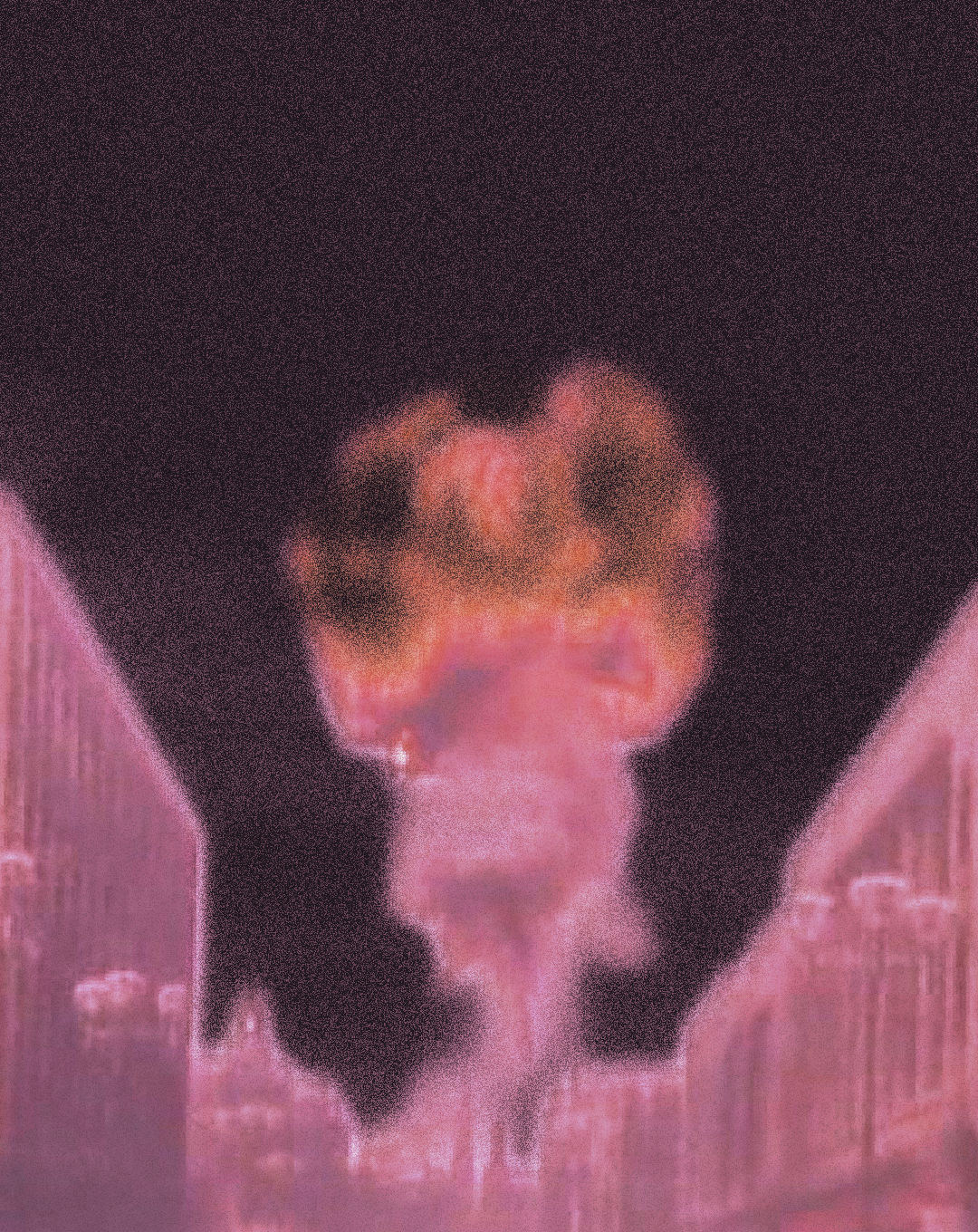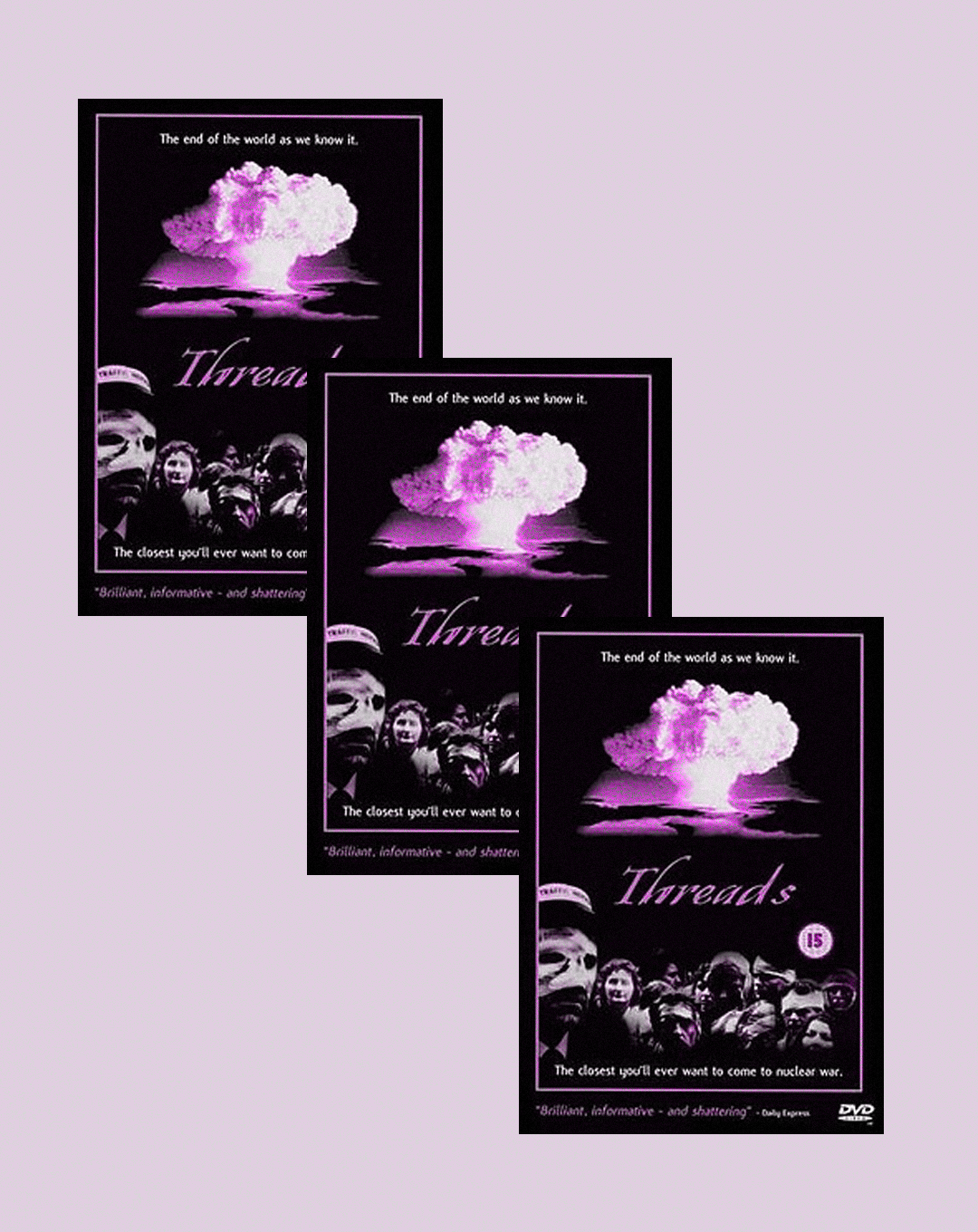Film Fatale: Threads (1984) and the Kitchen Sink Apocalypse
Words: Charlotte Amy Landrum
Make it stand out
It was a dark and stormy night. The football game my housemates watched in the room below my chamber ricocheted from wall to wall in replacement of the cry of a crow, and I stared blankly at a Twitter thread about the ethics of euthanasia. I’ve only recently gotten into Twitter, or X as it is now called, despite seeing what it has done to some of the greatest minds of my generation. I was feeling quite low. Was it because I was ovulating or because of my excessive screen time? Either way, I knew there were two paths that sat before me: put down my phone, splash some cold water on my face and unlock the dusty, rusty box in the back of my brain which held all the self-help strategies the mental health nurses shared with me for the past 12 years, or continue to make myself feel worse.
And so I pressed play on Threads (1984) directed by Mick Jackson. I have wanted to see this film for a long time, but it is the type of movie you put off watching as you know it is going to make you feel vulnerable - like walking into a school assembly 5 minutes late the day you decided to dress goth for the first time. You suddenly regret every time you partook in self expression, letting your guard down and ultimately being alive, as people stare and roll their eyes. You feel raw, exposed to the elements. Threads is the cinematic audience’s equivalent.
When I was doing my filmmaking MA I exercised my student privileges and went to the library to take out a copy of the film but someone else had already got their paws on it. I thought it was ridiculous that masses of DVDs stood before me but the one I wanted, the BBC nuclear disaster TV movie set in Yorkshire in 1984, had been snatched up. I saw it as a sign that maybe I should just leave it and never thought about getting it on my screen again, but recently Film TikTokers had been popping up on my feed using Threads the same way creators use true crime stories and disturbing scientific discoveries to rope you in: “Guys… Watch this film at your own discretion. It TRAUMATISED a generation.” Not that I am a victim of TikTok film influencers, but I couldn’t allow myself to be left out on the most recent reupping of a film due to how Effed Up it is.
Unlike many other films that have trended online due to how ‘disturbing’ they are, such as Gummo (1997) or Tusk (2014), Threads actually fits the bill as it is, in fact, very uncomfortable to watch. There is little room to take a breath. But as with most times the internet grabs something to exploit it for all the clicks it's worth, the film is not just a shock for shocks sake, it is an example of how horrors can permeate when it takes place in a familiar setting. Long gone are the comforts of the American suburban home.
With any type of disaster move - Whether it is John Cusack (heart eyes emoji) saving his family from earthquakes and tsunamis in 2012 (2009) to Jake Gyllannhall (heart eyes cat emoji) surviving a modern day ice age in The Day After Tomorrow (2004), there are two comforts to be found. Firstly, the insane scale of what is happening being detached enough from real life that you can move on and secondly, some American dreamboat able to sort it all out. But in Threads, Sheffield has nowt, just like most people’s real lives, and that is why it made me feel small and scared.
The beginning of the film is the classic kitchen sink drama that never was. Scenes of a young working class couple, Ruth and Jimmy, working out an unplanned pregnancy in Thatcher’s northern England is played out with familiar twangs of accents and a terraced house filled with constant goings on. If you were born even close to Yorkshire, it is not difficult to imagine your own family on the screen. Yet between the domestic drama is a looming tension between America and the Soviet Union: the car radio is turned over whilst unrest in Iran is announced, fighter planes mysteriously pass overhead whilst Ruth and Jimmy have a cheeky snog in their car, anti-war protests begin in the town and speculation grows across the community. Supermarkets are rapidly emptied, families rush into their cars to get away from the city, and windows are boarded up - an optimistic attempt to soften the blow of what may come. Spoiler: 210 atomic megatons total fall on the UK and Sheffield, an industrial target, is in pieces.
Whilst we were previously invested in a young couple's life, we are now only spectators of destruction. You couldn’t even call this new narrative a story of survival, as characters we had once seen tottering around town outside Woolworths and in their living room are - if not immediately dead - now experiencing the unthinkable and helpless process of extreme radiation sickness.
I hit pause and made myself a herbal tea, considering that this maybe should have been a film I watched with someone else, possibly during the daytime and absolutely not when I was already feeling quite disturbed by my own life. In comparison to this semi-fictional Sheffield, I was fine and needed to grow up.
Threads is an example of when shock in cinema is relevant and necessary. As director Mick Jackson describes: “We couldn’t hold back, because to do so would have been to not tell the truth. People had to see it.” It would be irresponsible to follow up the gritty Northern realism with a rose tinted nuclear winter where characters only have scraped knees and bloody noses; where the thin planks of wood they hammered around their living room window sufficed the megatons that flashed through their streets.
The ongoing cold war during the film's release of 1984 is not too far away from the current state of affairs when it comes to whether or not we will be taken out by Russian nukes whilst we sleep. Everytime a BBC Breaking News alert comes up I hold my breath as it loads up its warning. When imagining a global disaster, I often go back to the Hollywood ideal and picture myself with a shotgun, out in the country with a truck and an unrealistic supply of cigarettes, scoping out my surroundings for any bad intentioned drifters or undead creatures coming my way. But in the IRL scenario, and especially a nuclear one, I assume it would be much closer to Threads than The Day After Tomorrow. In the wise words of one Letterboxd user: "If I ever see a mushroom cloud, I'm running towards it."


